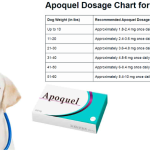In recent years, Cytopoint has emerged as a popular medication for pets suffering from chronic skin conditions such as atopic dermatitis. While this medication has been shown to provide impressive symptom relief in the short term, there are concerns about its long-term use.
In this section, we will provide an in-depth look at the potential risks and adverse effects of long-term Cytopoint use. We will explore the impact of this medication on your pet’s health and well-being, and provide insights into how to monitor their condition while on Cytopoint.
Key Takeaways
- Cytopoint is commonly used for pets suffering from chronic skin conditions.
- There are potential long-term side effects and risks associated with Cytopoint use.
- It is important to monitor your pet’s health while on Cytopoint and seek veterinary attention if necessary.
Is Cytopoint Safe for Long-Term Use?
As with any medication, there are safety concerns to consider when using Cytopoint for long-term treatment. While Cytopoint has been approved by the FDA for up to one year of continuous use, the long-term safety of the medication has not been fully studied beyond that point.
It’s important to note that every pet is unique and may react differently to Cytopoint. Some pets may experience no adverse effects from long-term use, while others may encounter complications.
One potential concern with the long-term use of Cytopoint is the possibility of decreased effectiveness over time. As the body becomes accustomed to the medication, the effects may diminish, leading to decreased relief for your pet’s symptoms.
Another safety consideration is the potential for Cytopoint to cause an immune system response, leading to the development of new allergies or other health issues. While this is a rare occurrence, it is still a possibility to keep in mind.
It’s important to discuss any concerns you may have about the long-term use of Cytopoint with your veterinarian. They can help you weigh the potential risks and benefits and determine if Cytopoint is the best option for your pet’s long-term treatment.
Potential Risks of Cytopoint
While Cytopoint is generally considered a safe and effective treatment for many pets, there are potential risks and complications associated with its long-term use.
One potential risk of Cytopoint is the development of infections, particularly of the skin and ears. This is because Cytopoint suppresses the immune system’s response, making it more difficult for the body to fight off infections. It’s important to monitor your pet for any signs of infection, such as redness, swelling, discharge, or odor, and seek veterinary attention if necessary.
Cytopoint can also lead to weight gain in some pets, which can have negative effects on their overall health and well-being. This is because Cytopoint can increase appetite and decrease activity levels. If your pet is gaining weight while on Cytopoint, it’s important to discuss with your veterinarian about adjusting their diet and exercise routine.
Another potential complication of Cytopoint is the development of gastrointestinal issues, such as vomiting and diarrhea. While these side effects are generally mild and temporary, they can be a cause for concern if they persist or worsen over time. Additionally, if your pet is already prone to digestive issues or has a sensitive stomach, Cytopoint may not be a suitable treatment option.
It’s also important to note that long-term use of Cytopoint may have unknown, long-term effects on your pet’s health. While studies have shown that Cytopoint is generally safe and well-tolerated, there is still much that is not yet known about its potential impact on the body over extended periods.
If you notice any complications or potential risks associated with your pet’s use of Cytopoint, it’s important to discuss these with your veterinarian. They can guide how to manage any side effects and determine the best course of treatment for your pet’s individual needs.
Understanding Long Term Use of Cytopoint
Cytopoint is a medication that is often prescribed for pets to alleviate symptoms associated with allergic dermatitis, such as itching and skin irritation. As with any medication, it is important to understand the potential impact of long-term use on your pet’s health.
When used over an extended period, Cytopoint may have some impact on your pet’s immune system. However, it is important to note that the effects are typically minimal. The medication is designed to target specific immune cells that trigger allergic reactions, without causing widespread suppression of the immune system. Therefore, it is unlikely that your pet will be at risk for infections or other health issues from long-term use alone.
Furthermore, Cytopoint has been extensively studied and has demonstrated a high level of safety for both short and long-term use. In particular, studies have shown that there are no significant changes in blood values, liver and kidney function, or overall health parameters in dogs that receive long-term Cytopoint treatment.
That being said, it is important to continue to monitor your pet’s overall health and well-being while they are on Cytopoint, especially if they are receiving the medication for an extended period. Your veterinarian may recommend regular check-ups to ensure that there are no unexpected changes in your pet’s health.
If you have any concerns about the long-term impact of Cytopoint on your pet’s health, it is important to consult with your veterinarian. They can provide you with guidance and recommendations based on your pet’s individual health profile and history.
Cytopoint Side Effects – What to Watch Out For
As with any medication, long-term use of Cytopoint can lead to potential side effects and complications to your pet’s health. Pet owners need to be aware of the signs and symptoms of these side effects to ensure the well-being of their furry friends.
Cytopoint Side Effects Long-Term: While short-term use of Cytopoint is relatively safe, it is important to note that there is still limited information on the long-term effects of the medication. In some cases, pets may experience long-term side effects such as infections, respiratory issues, and skin problems.
Cytopoint Medication Side Effects: In addition to long-term side effects, there are also potential side effects that can arise from the medication itself. These include vomiting, diarrhea, and lethargy. It is crucial to monitor your pet for any of these symptoms and seek veterinary attention if they occur.
If your pet is experiencing any of these side effects, it is important to consult with your veterinarian to evaluate the situation and discuss any necessary adjustments to their treatment regimen. Regular check-ups and open communication with your vet can also aid in identifying any potential issues early on.
Monitoring Your Pet’s Health on Cytopoint
As with any medication, it is crucial to monitor your pet’s health while they are on long-term Cytopoint treatment. This is especially important as Cytopoint is designed to provide long-lasting relief, and adverse effects may not become apparent immediately.
Regular check-ups with your veterinarian are essential to ensure your pet’s overall health and well-being. During these check-ups, your veterinarian will conduct a thorough physical examination, including any necessary blood tests or other diagnostic tests.
It is also crucial to pay attention to any changes in your pet’s behavior or health. If you notice any unusual symptoms or behaviors, such as lethargy, loss of appetite, vomiting, or diarrhea, contact your veterinarian immediately.
While Cytopoint is generally considered safe for long-term use, there are some safety concerns to be aware of. These may include allergic reactions, injection site reactions, and the potential for immunosuppression. It is crucial to discuss any safety concerns with your veterinarian and to follow their recommended monitoring protocols.
Your veterinarian may also recommend additional treatments or therapies to help manage any potential side effects or complications. These may include changes to your pet’s diet or the addition of supplements to support their immune system.
Overall, monitoring your pet’s health on Cytopoint is essential to ensure their long-term well-being. By staying informed and working closely with your veterinarian, you can help your pet live a happy and healthy life.
Addressing Cytopoint Safety Concerns
As with any medication, there are always safety concerns to keep in mind when using Cytopoint for long-term treatment. While Cytopoint is generally considered safe, its long-term impact on your pet’s health should be monitored carefully.
One of the primary concerns with long-term Cytopoint use is the potential for complications, such as infections or allergic reactions. These risks can be minimized by ensuring that your pet receives the proper dosage and monitoring their health regularly.
It is important to note that Cytopoint is not suitable for all pets, particularly those with a history of immune system disorders. If you have concerns about the safety of Cytopoint for your pet, it is essential to consult with your veterinarian to discuss alternative treatment options.
Regular check-ups with your veterinarian are also important to monitor the long-term effects of Cytopoint on your pet’s health. Your veterinarian can help you identify any potential complications and adjust treatment accordingly.
Overall, while Cytopoint can be an effective long-term treatment option for many pets, it is essential to be aware of the potential risks and complications. By working closely with your veterinarian and monitoring your pet’s health regularly, you can ensure their well-being while on Cytopoint.
Cytopoint Alternatives – Exploring Other Options
While Cytopoint is a commonly used medication for pets, its potential adverse effects and safety concerns make it understandable to explore other options for long-term treatment. There are alternative medications or therapies available that may be considered, depending on your pet’s condition and individual circumstances.
One alternative to Cytopoint is Apoquel, a medication that can help manage allergies in dogs. While Apoquel has its own set of potential side effects, it may be a better option for some pets who do not respond well to Cytopoint. Another alternative is immunotherapy, which involves giving controlled doses of the allergen to build up a pet’s immune system and reduce symptoms over time.
It is important to note that any alternative treatment should be discussed thoroughly with a veterinarian, taking into account the specific needs and conditions of your pet. While considering alternative options, it is crucial to weigh the potential benefits and risks, as well as the associated costs and practicality of the treatment.
Cytopoint Safety Concerns – Considerations to Keep in Mind
When evaluating alternative options to Cytopoint, it is important to consider the specific safety concerns that led to the exploration of alternatives in the first place. Some Cytopoint safety concerns include potential adverse effects such as vomiting, diarrhea, and lethargy. If your pet experiences any of these side effects, it is important to monitor their condition closely and seek veterinary attention if necessary.
Additionally, Cytopoint may not be suitable for pets with certain underlying conditions, such as liver or kidney disease. In these cases, alternative treatment options will need to be considered.
In conclusion, while Cytopoint can be an effective treatment for pets with allergies, it is important to consider the potential adverse effects and safety concerns associated with long-term use. Exploring alternative options in consultation with a veterinarian can help ensure the best possible treatment for your pet’s individual needs and condition.
Consulting a Veterinarian – Making an Informed Decision
- Consult Your Veterinarian: Essential for understanding the risks and benefits of long-term Cytopoint treatment for your pet.
- Evaluate Pet’s Medical History: Your vet will consider your pet’s health history and conditions that might influence Cytopoint’s effectiveness.
- Monitor Pet’s Health: Ongoing vet support is crucial for adjusting treatment plans and dosages based on your pet’s response to Cytopoint.
- Discuss Potential Side Effects: Be aware of possible reactions like vomiting, diarrhea, and lethargy, and learn how to manage them.
- Follow Dosage Guidelines: Adhere strictly to the recommended Cytopoint dosage and frequency as advised by your veterinarian.
- Seek Alternative Options if Needed: Your vet can suggest other treatments if Cytopoint is not suitable for your pet.
- Make Informed Decisions: Use veterinary advice to decide the best approach for your pet’s long-term health and comfort.
- Prioritize Pet’s Well-being: Partner with your vet to ensure the highest care standard for your pet’s specific needs during Cytopoint treatment.
Conclusion
In conclusion, Cytopoint is a medication commonly used for long-term treatment of pets suffering from atopic dermatitis. While it has proven to be effective in managing symptoms, there are potential risks and adverse effects associated with its long-term use.
It is crucial to monitor your pet’s health regularly while on Cytopoint treatment as there is the possibility of complications arising such as infections, skin issues, diarrhea, and vomiting. These can have a significant impact on your pet’s overall well-being.
Consulting with a veterinarian is essential in making an informed decision regarding the long-term use of Cytopoint. They can guide you through the potential risks and assess whether Cytopoint is suitable for your pet’s treatment plan.
While Cytopoint is a viable option for long-term treatment, it’s important to consider alternative treatments. Some other medications and therapies may be considered, depending on the severity of your pet’s condition and any adverse effects or safety concerns associated with long-term Cytopoint use.
In conclusion, Cytopoint has a long-term impact on your pet’s health. Still, with proper monitoring and guidance from a veterinarian, the potential complications can be minimized, making it an effective treatment for atopic dermatitis.










